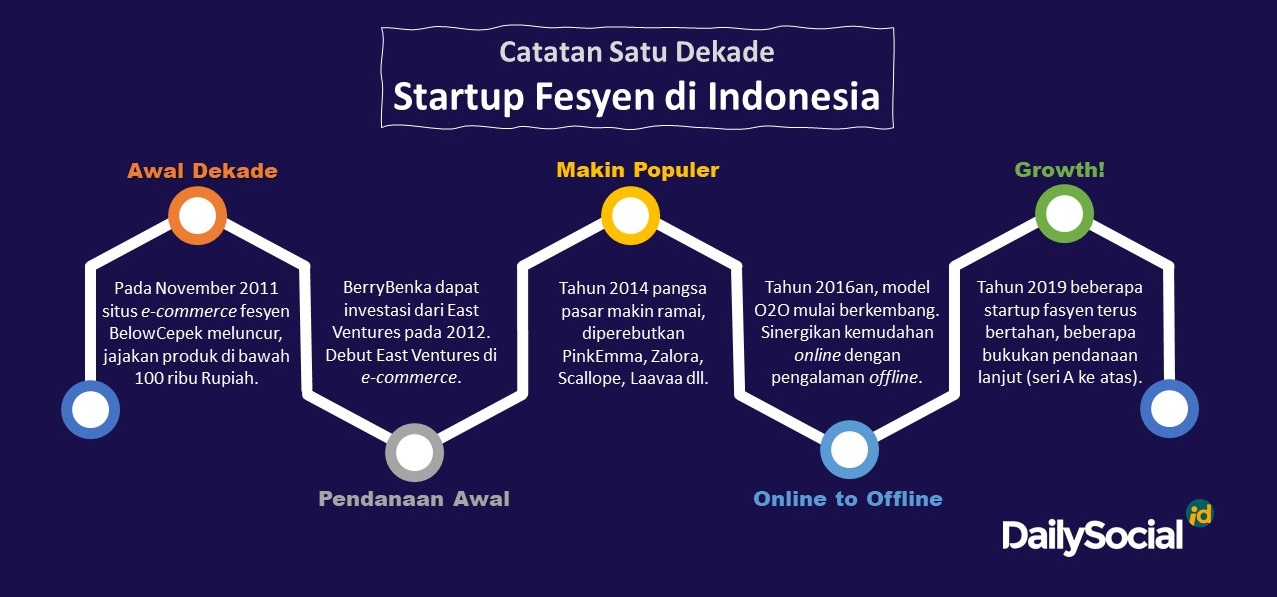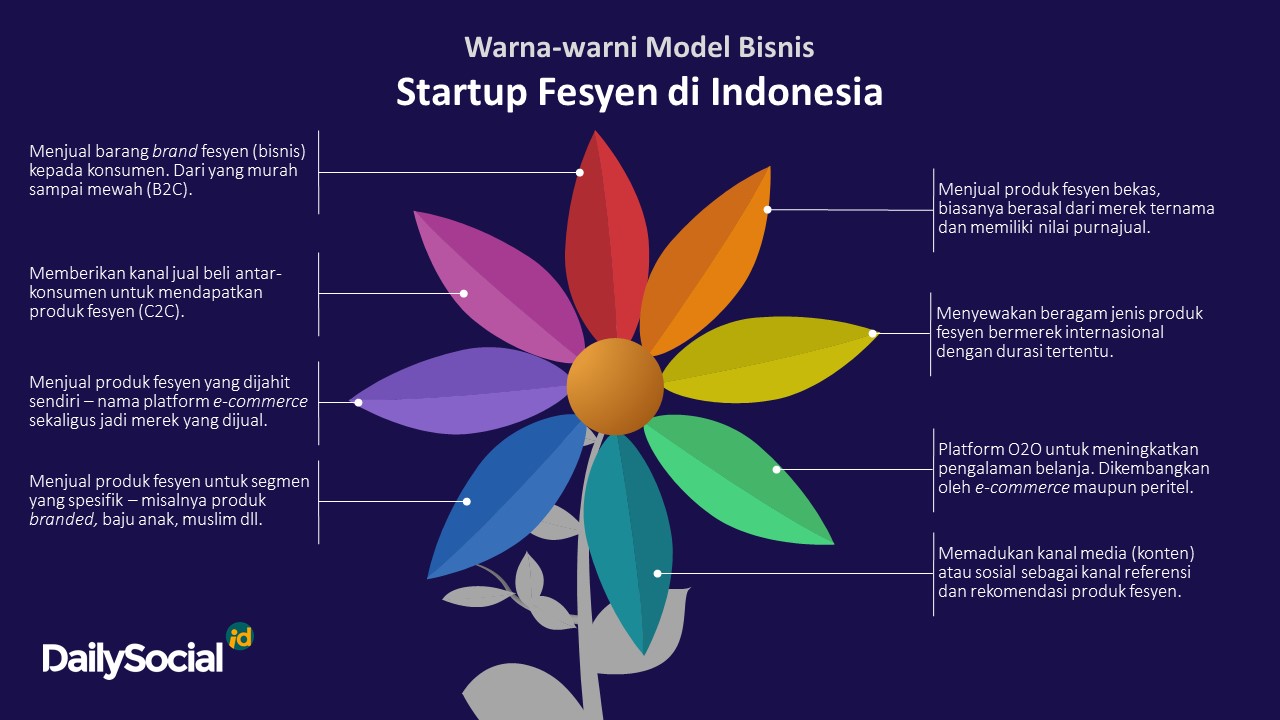Fashion Startup, Cultivating Potential in a Decade
Discuss market share trends, business models, to important lessons from failure stories
Menurut Startup Report published DSResearch, Over the past three years there have been several fashion startups that have continued to increase funding rounds, including Tinkerlust, Zilingo, Pomelo, Sorabel, Berrybenka, and Style Theory. Beyond that, there are many platforms E-commerce others in related segments that are still enduring in the midst of domination online marketplace which offers a wide variety of products.
Not only growing in quantity, the business models offered are also increasingly varied. Call it done Style TheoryInstead of selling, they present a mechanism for renting branded fashion products. To DailySocial they said, since 2017 their presence in Indonesia has grown and has around 150 thousand users. In fact, they only serve the cities of Jakarta, Bandung, and Surabaya.
This fact clearly indicates that this business segment has tremendous potential. Let's dive into it.
Fashion market share in E-commerce
In the report eCommerce Report 2020 - Fashion mentioned revenue This business segment in Indonesia is estimated to reach $6,7 billion as of 2020. This figure will reach $12,6 billion by 2024. Indonesia's market share is ranked 11th globally.
Platform online marketplace with a variety of products also often places fashion products, especially those with a female market share, in the best-selling product line. Presented in the shopping report online at Tokopedia, throughout 2019 the five most popular product categories included fashion, household, cell phones, electronics, and health.
Other data from Kredivo shows shopping trends throughout 2019. Both male and female users spend the most on services credit on platform E-commerce to meet fashion needs based on the number of transactions.

Fashion startup journey
news DailySocial take notes hyping startup "niches" fashion has started since the beginning of the decade. In 2011 several players such as BelowCepek and LocalBrand began to introduce themselves to the public. At that time, the strategy used was to differentiate in terms of products, for example, what BelowCepek did by selling various clothes at low prices under 100 thousand Rupiah. Likewise LocalBrand which prioritizes local brands in the midst of the onslaught mass product which has a lot of stairs in a shopping center.
Trends in the presence of fashion startups continue to emerge. The following year Zalora, BerryBenka came to change the stigma in this business vertical. Zalora is a regional player who is fully supported by Rocket Internet – at that time known as one of the world's disruptive digital business printers. Meanwhile, BerryBenka managed to record initial funding from East Ventures, as well as being the debut of the venture capitalist to enter the vertical E-commerce, especially fashion.
Scallope, Laavaa, FimelaShop, Ratimaya, PinkEmma, and several other startups are increasingly enlivening the online market.
In 2014 Riselo came and offered the concept online marketplace for fashion. Previously, most of the models were B2C, now they offer C2C models. Adopt from success online marketplace which accommodates the product in general. In this period, the E-commerce become an important locomotive for digital business, making everyone more familiar with transactions on the internet. Intense competition makes each player innovate in the business model.

In the 2017's, draft online to offline (O2O), players such as BerryBenka, Zalora, Hijub started to present physical stores in shopping centers. But not only done by players e-commerce, retailers are also strengthening their sales strategy through digital channels, such as Onmezzo (Metrox Group), Matahari, and MApemall.
Towards the end of the 2020 decade, some players are getting stronger while the rest are not showing up growth. Sorabel (formerly Sale Stock), for example, was able to book Series C funding to support its business acceleration.
Technology that is increasingly becoming the lifeblood of life has also encouraged the emergence of “indie” brands that have marketed and sold their products online from the start online, some O2O, as fashion brands Cloth-Inc or Pomelo do.
The business model is the difference
In 2015 Samira Shihab (CEO) and Aliya Amitra (COO) started Tinkerlust as a unique fashion startup that sells branded and luxury goods. Not only new products, they also sell stuff pre-loved which is still in good condition. Traction is good, until two years later get initial funding from Merah Putih Inc and angel investors Danny Oei Wirianto. In addition to being a fashion buying and selling platform pre-loved, they also offer rental of designer dresses.
Yuna & Co have another way, they choose optimize artificial intelligence bring interactive content features “fashion matchmaker”. Simply put, with this application users can take advantage of a virtual assistant to provide the best fashion recommendations based on personal preferences. They also become intermediaries between fashion brands and consumers, through product recommendations that are presented. This approach was taken, considering that not a few women have a lot of considerations and are selective when doing shopping, especially in a personal way online.
Then, as mentioned earlier, there is also Style Theory which offers rental options for various branded fashion products. They offer a subscription model and on-demand for its customers. Currently, the business is fully supported through Series B funding by SoftBank Ventures Asia, The Paradise Group, and Alpha JWC Ventures.
"Style Theory's market share is basically all Indonesian women who need a fairly high variety of clothes for their daily activities. Among them are women in productive age who work outside the home, be it office workers, freelancer, and other jobs that often meet a lot of people. This is the market share that will benefit the most from our services," said the Style Theory team.

More Coverage:
The business model is the key to the success of startups in this vertical. Basically they have to compete with the traditional retail order that has been a reference for the community for years. Things related to culture also need to be well captured by consumers – for example the habit of seeing or trying things physically before actually buying. Sorable one of which is sensitive to this condition, a fashion startup with private-label it has an option that allows its customers to try the product delivered by the courier before actually completing the transaction with payment.
Those who don't survive
Unfortunately, unique features, even investor support, do not guarantee a fashion startup to survive. 2018 Lyke announce closing service. After the series A funding, they were quite optimistic about their business, to the point of recruiting the celebrity Agnez Mo as co-founder all at once ambassador. Lyke is also leveraging artificial intelligence that allows users to search for products based on photo uploads. From the outstanding issues, business inefficiency became an obstacle that resulted in the startup closing.
In early 2017, the Lolalola platform also officially closed its business. They specifically sell women's underwear or lingerie. One of the factors that made him give up, the hectic trend social commerceand onslaught online marketplace such as Tokopedia, which also makes it easier for consumers to find related products. Despite claiming to have a unique and attractive product, if this is not accompanied by a fairly massive marketing and customer acquisition strategy, it will be difficult to achieve a sustainable condition.
Jeffrey Joe, Managing Partner & Co-Founder of Alpha JWC Ventures provided the analysis. "Fashion commerce is a sector that profit, there isn't any one winner takes all, so that even if there are several giants, there will still be room for players niche and new players. Style theory, for example, originally appeared as a product niche in Singapore then Indonesia, but now managed to make fashion rental something normal/common and part of everyday urban life."
He continued, “The principle sustainability fashion startups is a question that should be asked of each startup. For Style Theory, from the beginning they carried the concept circular economy to reduce consumption and fashion waste, as well as to answer the big problem of women who tend to keep buying clothes but not being used. Sorabel also uses machine learning to study buying trends, so that they only make clothes that are most likely to sell; they also control the manufacturing process, so as to minimize waste from various stages of production and distribution.”
Sign up for our
newsletter
